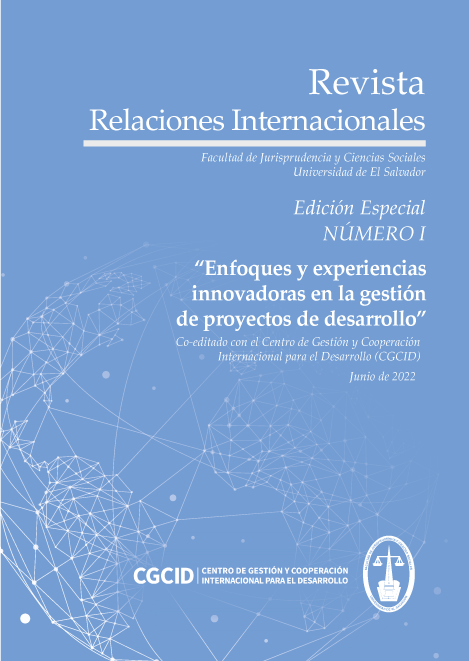Approach to the evaluation processes of development projects contemplated in the institutional framework of the international cooperation agencies of Latin America
Keywords:
Agency for International Cooperation, Projects evaluation, Latin America - institutional framework, Management and execution of cooperationAbstract
The Latin American region is not new in terms of International Cooperation Agencies, thus being in chronological order, the first Agency created in the region the ABC of Brazil, followed by the AGCID of Chile, then the APCI of Peru is created, later the AUCI of Uruguay is created, then, in the same year the APC of Colombia and the AMEXCID of Mexico are created, and finally, the ESCO of El Salvador is created, the first Agency at the Central American level. The purpose of this article is to study the first six Latin American cooperation agencies and their project evaluation processes established within their institutional framework, since, as their main criterion, it is necessary that they have experience of management and execution of cooperation in development projects; in addition, they must have a bibliographic repertoire of publications and public information about their work. Using these bibliographic inputs of each Agency, carrying out a review and documentary analysis, the inclusion of units or offices in charge of the evaluation of projects will be identified in its organizational structure, analyzing the relevance that each Agency provides to said action in accordance with the provisions of its institutional frameworks; in addition, relevant information regarding their evaluation processes will be collected to determine, if possible, which types of evaluation are used and whether the Agencies have gone through a process of learning or improvement with respect to evaluations.
Downloads
References
ABC, Directrices Generales para la Concepción, Coordinación y Supervisión de Iniciativas de Cooperación Técnica Trilateral (1era edición. Brasil. 2019)
ABC, Diretrizes para o Desenvolvimento da Cooperação Técnica Internacional Multilateral E Bilateral (Brasil, 5ta edición, 2020)
AgecidChile: Normativa y Ley, Normativa aplicable. AgecidChile. acceso el 1 de octubre de 2021. https://www.agci.cl/acerca-de-agci/normativa-y-ley
Agencia Presidencial de Cooperación Internacional, Manual de Formulación de Proyectos de Cooperación Internacional. (Colombia, 2012). https://ccong.org.co/files/126_at_Manual%20de%20Proyectos%20Version-Final-010812.pdf
APC: Caja de herramientas para el fortalecimiento de la Cooperación Sur-Sur. 2021 https://www.apccolombia.gov.co/Caja-de-herramientas-para-el-fortalecimiento-de-la-Cooperacion-Sur-Sur
APCI: Funciones. APCI. acceso 1 de octubre de 2021, http://portal.apci.gob.pe/index.php/informacion-institucional-2/funciones
Arroyo, A y Torres, G. Metodología de Evaluación Social de Proyectos de Caminos Rurales en México. Sanfandila, 2003. https://www.imt.mx/archivos/Publicaciones/PublicacionTecnica/pt234.pdf
AUCI. Glosario y Tipologías de la Cooperación Internacional. 2016. https://www.gub.uy/agencia-uruguaya-cooperacion-internacional/comunicacion/publicaciones/glosario-y-tipologias-de-la-cooperacion-internacional
AUCI: publicaciones, La cadena de valor de la cooperación internacional al desarrollo en Uruguay. Acceso el 9 de octubre de 2021. https://www.gub.uy/agencia-uruguaya-cooperacion-internacional/comunicacion/publicaciones/cadena-valor-cooperacion-internacional-desarrollo-uruguay
Chiani, Ana María. La Cooperación Internacional al Desarrollo: Herramienta clave para el desarrollo de nuestra región. Buenos Aires: ACEP. https://www.kas.de/c/document_library/get_file?uuid=c920df51-f9ec-b210-e38d-2bbe7024dd3c&groupId=287460
Comité Internacional de Rescate-IRC. IRC’s Guide to Design, Monitoring and Evaluation (2005), 62. https://fdocuments.in/reader/full/irc-guide-design-monitoring-evaluation
Decreto N° 4152 (Colombia: Departamento Administrativo De La Función Pública, 2011). artículo 2, 12-15. http://wp.presidencia.gov.co/sitios/normativa/leyes/Documents/Juridica/Decreto%204152%20de%202011.pdf
González G, L. Guía para la gestión de proyectos de cooperación al desarrollo. Bilbao. 2007. https://publicaciones.hegoa.ehu.eus/uploads/pdfs/119/Guia_para_la_gestion.pdf?1488539268
IMPO: Normativas y Avisos Legales del Uruguay Ley N° 18719. Centro de Información Oficial, acceso 9 de octubre de 2021. https://www.impo.com.uy/bases/leyes/18719-2010
Ley 18989, (Chile: Ministerio de Planificación y Cooperación). https://www.bcn.cl/leychile/navegar?idLey=18989
Ley de Cooperación Internacional para el Desarrollo (México: Secretaría de Gobernación, Diario Oficial de la Federación. 6 de abril de 2011, artículo 11. http://dof.gob.mx/nota_detalle.php?codigo=5184958&fecha=06/04/2011
Lucena, Hernan. South-South Cooperation in the 21st Century: New Challenges. Mérida: CEAA, 2021. https://www.researchgate.net/publication/354723001_South-South_Cooperation_in_the_21st_Century_New_challenges
OCDE, Estándares de calidad de evaluación del CAD. OCDE. 2006. https://www.oecd.org/development/evaluation/dcdndep/38452075.pdf
OCDE, Glosario de los principales términos sobre evaluación y gestión basada en resultados. Paris. 2002. https://www.oecd.org/dac/2754804.pdf
OCDE, Glosario de los principales términos sobre evaluación y gestión basada en resultados (2 rue André Pascal, Francia, 2002). 16, ISBN 92-64-08527-0. https://www.oecd.org/dac/46387212.pdf
Presidencia: Política de Cooperación Internacional de Uruguay para el Desarrollo Sostenible al 2030. Uruguay, 2018. https://www.gub.uy/agencia-uruguaya-cooperacion-internacional/politicas-y-gestion/politica-estrategia-cooperacion-nacional
Rina Norelbi Escobar Bonilla, Rocío Beatriz Toledo Munguía. “El Comportamiento de la Cooperación Triangular en El Salvador y sus Aportes en las Estrategias de Desarrollo Impulsadas durante el periodo de 2010-2013”. (Tesis de Grado, Universidad de El Salvador, 2015), 6. https://ri.ues.edu.sv/id/eprint/8530/1/TESIS%20COOPERACI%C3%92N%20TRIANGULAR%202015%20RyN.pdf
Rodríguez y Zeballos. Evaluación de proyectos de desarrollo local. Lima, Perú, 2007. http://repositorio.usil.edu.pe/bitstream/123456789/1356/3/2007_Rodriguez_Evaluacion-de-proyectos-de-desarrollo-local-Enfoques-metodos-y-procedimientos.pdf
Secretaría de Relaciones Exteriores-DGPOP.Manual de Organización de la AMEXCID (septiembre 2012). 8 y 22, https://sre.gob.mx/images/stories/docnormateca/manadmin/2012/moamexid.pdf
Talita Yamashiro. Triangular cooperation, and aid effectiveness. Ciudad de México, 2009.
Terre Des Hommes – TDH. Project Cycle Handbook(Headquarters Avenue de Montchoisi 15, CH-1006 Lausanne, 2012). 77, https://www.tdh.ch/sites/default/files/tdh_mcp_en_interactif_docprinc_23-10-12_-_mono_ok_0.pdf
The Centre for International Development and Training (CIDT) de la Universidad, Capacity Building in Project Identification, Formulation and Design (Universidad de Wolverhampton, Reino Unido, 2011). 68. https://standardsfacility.org/sites/default/files/EIF_HandbookProjectDesign_Feb-12.pdf
UNICEF, Methodological Briefs Impact Evaluation No. 2 (2014), i, https://content.changeroo.com/wp-content/uploads/Academy/2017/07/rogers_2014_theory_of_change_-_methodological_briefs_-_impact_evaluation_2.pdf
Valdés, M. La evaluación de proyectos sociales. Chile, Santiago, 1999 https://mapunet.org/documentos/mapuches/evaluacion_proyectos_sociales.pdf
Downloads
Published
How to Cite
Issue
Section
License
Copyright (c) 2022 Revista Relaciones Internacionales

This work is licensed under a Creative Commons Attribution-NonCommercial 4.0 International License.
The authors transfer the copyright rights in favor of the Faculty of Jurisprudence and Social Sciences of the University of El Salvador (through Aequus Editorial) to include their writing in Revista Relaciones Internacionales.








